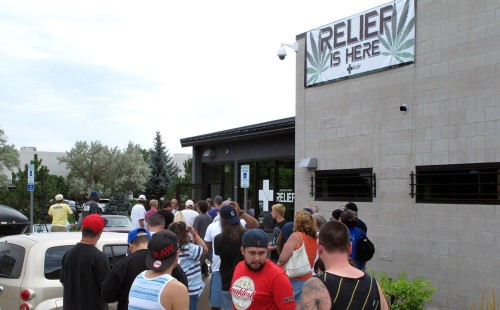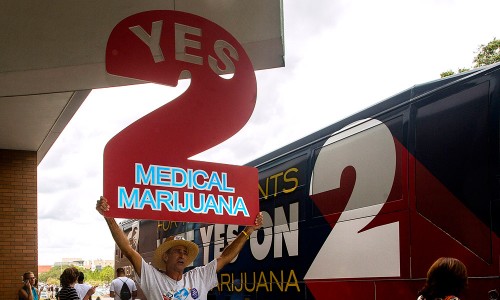Legal cannabis has been a hot topic in the march to Election Night 2016.
Dozens of petitions have circulated across the United States. Some have successfully cleared the necessary regulatory hurdles to secure a spot at the ballot box. Others have fallen short.
Election 2016: Complete coverage of state results
Come November, voters in nine states will decide on whether to legalize either the recreational use or the medical use of marijuana: Arizona, Arkansas, California, Florida, Maine, Massachusetts, Montana, Nevada and North Dakota.
Below is a rundown of the states with legal recreational and medical cannabis on the line as well as some others that missed the mark for this election.
We’ll keep this list current as the calendar counts down to Election Day:
UPDATED NOV. 4: The Arkansas Supreme Court won’t reconsider its decision to disqualify medical marijuana Issue 7.
Other recent updates include news on Oklahoma’s medical marijuana initiative landing on a future ballot; a court victory for one of Arkansas’ medical marijuana measures; Missouri medical marijuana proposal not making the ballot; Michigan legalization losing in court; and the Arizona Supreme Court ruling on challenge to legalization initiative.
POLLS: Roundup of recent surveys on recreational legalization measures
MAP: Interactive U.S. map breaks down marijuana laws by state
Recreational marijuana on the ballot
Arizona
Proposition 205: If approved, this measure would allow adults to carry up to an ounce, grow up to six plants and consume marijuana in non-public spaces. Retail marijuana sales would have a 15 percent tax imposed.
In August, the initiative received the official go-ahead to appear on the ballot, nearly two months after The Campaign to Regulate Marijuana Like Alcohol submitted more than 250,000 signatures to the Arizona Secretary of State’s office.
Meanwhile, legalization opponents had filed a lawsuit against the campaign in mid-July, seeking to block it from the ballot. The suit alleged that the petition circulated did not include full details about the initiative. After a Maricopa County Superior Court judge dismissed the challenge, the ruling was appealed to the state Supreme Court.
On Aug. 31, the Arizona Supreme Court affirmed the lower court’s decision that had comprehensively rejected all of the reasons presented by opponents for keeping the initiative off the ballot, marking an end to the legal challenge.
California
Proposition 64: If successful, this well-heeled initiative would make recreational marijuana legal all along the West Coast and establish what some view could be a linchpin for federal legalization.
The passage of Proposition 64, a.k.a. the Adult Use of Marijuana Act, would legalize marijuana for people 21 years of age and older. Adults could possess up to an ounce of cannabis, purchase dried flower and cannabis products from licensed retailers and grow up to six plants for personal use. The proposal has restrictions on where cannabis can be consumed.
Election 2016
Stay primed: The latest election news
Pot politics: The latest political news
Going global: As U.S. laws are forming, what the rest of the world is doing
Weed news and interviews: Get podcasts of The Cannabist Show.
Subscribe to our newsletter here.
Watch The Cannabist Show.
Peruse our Cannabist-themed merchandise (T’s, hats, hoodies) at Cannabist Shop.
Counties and municipalities would have the ability to limit or ban commercial marijuana operations, as well as set local tax rates.
The initial taxes imposed would be a 15 percent state excise tax on retail sales, and cultivation taxes of $9.25 per ounce of flower and $2.75 per ounce of trim/leaves. Backers estimate that the Adult Use of Marijuana Act could potentially result in $1 billion annually in state tax revenue.
Other provisions include a restriction on marketing toward minors and allowing for resentencing and the expungement of records for prior marijuana convictions.
Tech billionaire Sean Parker, the Napster founder and former Facebook president, has plunked more than $1 million into the legalization campaign. Groups opposing the recreational measure include the Citizens Against Legalizing Marijuana and the California Police Chiefs Association.
California was the first state in the nation to legalize medical marijuana, in 1996.
Maine
Question 1: This proposal’s path to voters was not a simple one.
In February, the Campaign to Regulate Marijuana Like Alcohol delivered more than 99,200 signatures to the Maine Secretary of State. The Marijuana Policy Project, a national advocacy and lobbying organization, is coordinating a number of the state initiatives and campaigns under the “Regulate Marijuana Like Alcohol” umbrella.
A month later, 47,686 of those signatures were invalidated, leaving the campaign roughly 9,500 John Hancocks short of the threshold to make the ballot. Soon, a notary landed in the spotlight and a court battle ensued.
By the end of April, the referendum proposal was successful in making it to the ballot. Voters will decide whether to legalize the recreational use of marijuana for people 21 years of age and older, which would also allow an adult to grow up to six plants. The proposal includes a 10 percent sales tax on retail marijuana and marijuana products.
The initiative has prohibitions on places of consumption, including restricting use to a private residence, and it allows municipalities to regulate the number of retail stores or ban them entirely.
Massachusetts
Question 4: Like its neighbor to the north, Massachusetts had a legal scuffle over its ballot initiative.
Lawsuits alleged that those who signed the petitions were misled because it was not clear that the proposed law could allow for the sale of edibles and concentrates. Those arguments eventually were struck down by the state’s Supreme Judicial Court, which opted not to disqualify the proposal.
Under the measure, adults 21 and older can possess up to an ounce of pot, keep up to 10 ounces of marijuana at home and grow up to six plants. Marijuana sold in licensed shops would be subject to an excise tax of 3.75 percent in addition to Massachusetts’ 6.25 percent state sales tax.
The initiative allows for the creation of a 15-member cannabis advisory board to study and make recommendations on regulations and marijuana products.
Individual counties, cities and towns would have the ability to enact additional taxes as well as bans on recreational marijuana operations. The use of marijuana would be restricted to private places.
Massachusetts voters approved medical marijuana in 2012; the first dispensary opened in June 2015.

Nevada
Question 2: While some states’ marijuana initiatives are successfully skating in before key 2016 deadlines, Nevada’s has been on the ballot for nearly 18 months.
At the tail end of 2014, Nevada Secretary of State Ross Miller certified that the recreational marijuana initiative received the necessary signatures to place it on the November 2016 ballot.
The Regulation and Taxation of Marijuana Act follows moves by various Nevada counties to adopt medical marijuana regulations and would make it legal for adults age 21 and older to buy marijuana for recreational use, possess up to an ounce and grow up to six plants at home — if that residence is more than 25 miles away from a licensed dispensary.
The initiative includes some limitations on the number of retail outlets in a specific county — the populous Clark County, home to Las Vegas, can have up to 80 shops, while every other county under 55,000 people can have no more than two recreational stores.
Wholesale marijuana would be subject to a 15 percent excise tax. Cannabis consumption would be restricted to private premises, which could include a retail marijuana store.
Medical marijuana on the ballot
Arkansas
Voters in the Natural State initially were expected to decide on two medical marijuana initiatives come November; however, those options were whittled to only one following a state supreme court ruling made less than two weeks before Election Day.
If approved by voters, the Arkansas Medical Marijuana Amendment (Issue 6), is a proposed constitutional amendment that would allow an independent commission to award licenses for up to eight grow facilities and up to 40 for-profit dispensaries statewide. Home growing is not allowed.
Votes will not be counted for the Arkansas Medical Cannabis Act (Issue 7), after a split-decision ruling by the Arkansas Supreme Court. The proposal would have allowed for no more than one nonprofit “cannabis care center” per 20 pharmacies, and the Arkansas Department of Health would provide program oversight, funded completely by taxes imposed on the medical marijuana. Sponsor Arkansans for Compassionate Care estimated that this would’ve amounted to 38 dispensaries.
The unsuccessful measure would have allowed for some home growing for individuals who lived more than 20 miles from a cannabis care center.
Both measures were approved for the ballot, but faced legal challenges seeking to disqualify votes as well as pushback from state officials. Gov. Asa Hutchinson is an outspoken opponent of the measures, which the state finance department on Oct. 20 said would have more costs than revenue.
In early September, a Little Rock attorney asked the Arkansas Supreme Court to disqualify Issue 7 over “potentially invalid signatures.” A few days later, an anti-marijuana coalition that had already filed a challenge seeking to block Issue 7 also asked the state’s highest court to disqualify the competing Issue 6 for similar reasons.
Near the end of September, The Arkansas Supreme Court rejected one of two challenges against Issue 7. In late-September, a retired judge appointed by the Arkansas Supreme Court declared that Arkansans for Compassionate Care’s medical marijuana initiative had more than enough valid signatures to appear on the ballot.
On Oct. 13, the court rejected the lone challenge against Issue 6, clearing the way for votes to count for the constitutional amendment.
Issue 7, however, was not successful. In a 5-2 decision on Oct. 27, the Arkansas Supreme Court disqualified the measure after judges tossed out more than 12,100 signatures, saying they did not comply with laws regarding registration and reporting of paid canvassers, according to the Associated Press. Proponents filed a petition to have the court revisit the case; but on Nov. 3, the justices in a 5-2 decision declined to rehear the case.
Because the court’s decision came after early voting had already begun, a separate lawsuit was filed Nov. 2 asking that election officials allow some voters who cast a ballot for Issue 7 but not Issue 6 before the ruling be allowed to vote again, the Associated Press reported. The suit also asked that election officials be required to post prominent notices at polling places that Issue 6 is the only valid medical marijuana proposal on the ballot.

Florida
Amendment 2: Under the proposal, the state Department of Health would register and regulate dispensaries as well as issue ID cards to patients and caregivers. Individuals with medical conditions such as HIV/AIDS, epilepsy, multiple sclerosis, PTSD and Crohn’s would have to receive approval from a licensed Florida physician to be eligible for medical marijuana.
The amendment requires parental consent for minors.
A successful constitutional amendment in Florida requires the approval of at least 60 percent of voters to pass. Two years ago, a medical marijuana measure also on the ballot as Amendment 2 fell just 2.4 percent shy of that threshold.
Some Floridians suffering from cancer, epilepsy or a terminal condition are allowed to possess low-THC cannabis oils containing cannabidiol (CBD), but the use of medical marijuana currently does not extend much further beyond that.
Montana
Ballot Issue 24 (I-182): The state program, approved by voters in 2004, has been in flux this year amid a court battle. In February, the Montana Supreme Court upheld 2011 state laws limiting medical marijuana providers to three patients apiece; the law went into effect Aug. 31.
Useful weed resources
Strain reviews: Check out our marijuana reviews organized by type — sativas and sativa-dominant hybrids, ditto with indicas.
Favorite strains: 25 ranked reviews from our marijuana critics
Follow The Cannabist on Twitter and Facebook
Initiative 182 was filed as a means of expanding legal access to medical marijuana. The proposed initiative would repeal the three-patient limit and other requirements such as unannounced inspections and required reviews for physicians who provide certifications. The qualifying conditions under this initiative would include chronic pain and PTSD.
An issue has come to light about I-182: If it is approved by voters, the implementation of the law could be delayed for months because of an error written into the measure, according to The Associated Press.
Two other Montana marijuana initiatives — one to repeal the medical marijuana law entirely and the other to allow for recreational sales — fell short of the ballot. Keep reading for more info on those.
North Dakota
Initiated Statutory Measure No. 5: The North Dakota Compassionate Care Act would allow for the possession of up to 3 ounces of marijuana for qualifying conditions such as AIDS, cancer, epilepsy and glaucoma. The proposal allows for people who live more than 40 miles from a licensed dispensary to grow up to eight plants.
The North Dakota Secretary of State’s office verified the initiative on Aug. 11. A separate initiative to legalize the recreational use of marijuana failed to reach the signature threshold.
Future ballot measure
Oklahoma
State question 788: This initiative sponsored by Oklahomans for Health would allow for use, sale and growing of marijuana for medicinal purposes. The measure does not have qualifying health conditions, but would require approval of a state-certified physician for a patient to apply for a license.

Where it stands: Voters won’t see the measure in November because a fight over Attorney General Scott Pruitt’s rewording of the ballot measure and questions about signatures landed in front of the state’s highest court. Pruitt submitted the revision on Aug. 25, two days after the Secretary of State’s office announced the initiative had surpassed the threshold for petition signatures required to get on the ballot. According to The Associated Press, state officials say there’s not enough buffer time for legal challenges ahead of deadlines to get ballots verified and mailed to military members and overseas voters.
“It’s important for the people of Oklahoma to know — regardless of the substance of the state question — the signatures were not submitted with enough time to allow this process to be played out completely,” Pruitt said.
On. Sept. 6, a lawsuit was filed alleging that Pruitt’s rewrite of the medical cannabis ballot question misleads voters. Attorney David Slane, who filed the lawsuit, accuses Pruitt of being biased against the proposal and rewriting the question to confuse voters.
At the end of September, supporters said a 10-day protest period for their case passed without challenge, meaning the measure will be put on a future ballot. That likely will happen in 2018, but supporters do plan to lobby for a special election.
Officially out for 2016
Missouri: A judge’s ruling Sept. 21 about a lack of valid petition signatures effectively scuttled efforts to get a medical marijuana proposal on the state ballot. The Associated Press reported New Approach Missouri, the group backing the initiative, said it likely wouldn’t appeal the ruling because absentee voting begins Sept. 27. The medical marijuana initiative would not require qualifying conditions but rather allow for state-licensed physicians to make the determination on a per-patient basis.
Michigan: On Sept. 7, the state appeals court and the Michigan Supreme Court each turned down appeals by the group MI Legalize, a.k.a. the Michigan Comprehensive Cannabis Law Reform Committee. The pro-legalization group was unsuccessful in its efforts to get all of its submitted signatures counted by the state; more than 200,000 signatures were rejected by the Board of State Canvassers because they fell outside a 180-day time limit for collected signatures. The proposed initiative would legalize all forms of marijuana for adults 21 years and older and allow adults to grow up to 12 plants. Recreational sales would be subject to a 10 percent excise tax.
Montana: The sponsor of I-176, a measure that would repeal the state’s medical marijuana laws, isn’t going to pursue an appeal after a judge rejected his challenge to get the initiative on the ballot. Billings car dealer Steve Zabawa, who leads the group Safe Montana, told The Associated Press in a report published Aug. 24 that there isn’t enough time for him to appeal to the Montana Supreme Court before the Secretary of State’s office certifies the November ballot. He said Safe Montana will instead focus on defeating I-182, which seeks to lift a three-patient limit on medical marijuana providers. If Safe Montana’s initiative had been approved for the ballot, such a repeal would be unprecedented, said Allen St. Pierre, a spokesman for the National Organization for the Reform of Marijuana Laws’ Washington, D.C., office.
A ballot measure known as CI-115, which would legalize the recreational use of marijuana, fell short on signatures, according to the Valley Journal.





